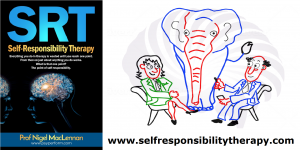
Therapists’ Experience of SRT (Self-responsibility Therapy) starts as every therapy does, with the gathering of the case history and background factors. What is that larger process like when you practice SRT as part of your therapy?
When you understand the importance of self-responsibility (SR) on mental health, everything the client says contains rich meaning. Indeed, even the way the client expresses what they say contains vast amounts of information about the role of self-responsibility in their problem.
The client is, almost by definition, blind to the SR factors. I say, ‘by definition’, because if the client had full awareness of the SR factors, they would probably not have needed therapy. Even that qualification needs qualification. I say ‘probably’ because there are some circumstances in life for which few people are prepared, few have ever needed to deal with, and certainly have never learned to take SR in that regard.
Here is a common misunderstanding that some people have of SRT:
“If you are saying that SR is the way to solve the problem,
you are also saying that the client caused their own problem!”
Leaving aside the reasoning error contained therein, there are, without a doubt, some clients who DO cause their own problems, but that is far, very far, from the case with all clients. Many clients did not cause, or even remotely contribute to their problem; they are causally, entirely innocent.
That observation can lead clients to think of themselves as victims, and many in the therapeutic community collude with that conclusion. Such collusion can come from the wholly understandable desire to form a strong client rapport, or, from more sinister motives: creating a victim helps create a client who will need years of therapy to recover.
Even some clients, who are motivated to recover, can have the same misunderstanding:
“If you are saying that SR is the way to solve my problem,
you are also saying that I caused my problem.”
Leaving aside the reasoning flaw there, again, the client may be causally innocent, and many are. BUT, and it is a huge but, the only person who can recover from the problem, if recovery is possible, is the client, however it was caused.
No amount of knowledge or expertise on my part, or yours, is going to solve the client’s problem. They have to make that journey (whether they are causally innocent or not).
SRT can appear, to those untrained in its techniques, to be ‘victim blaming’. That is simply not even remotely true. In fact, several of the possible opposites are the case:
- The client is guided, actively directed, to see how they can move from victim to victor.
- Clients are equipped to deal with future unplanned and unpleasant life events better than before, thus are less likely to be victims.
- Clients are guided to see how adopting the victim mentality is one of the worst things any human can do to themselves, and seek to avoid such destructive self-labelling.
Over the years, I have seen people who have experienced the most horrible events, not of their making, being further traumatised by ‘therapists’ treating them like victims. The client has then adopted that victim mentality and become even more troubled, and subsequently develops new problems that otherwise they would not have had. I am referring to people who have experienced sexual abuse, physical abuse, attempted murder, war trauma and the like.
After years of a never-ending dependency cycle, when such clients are guided to SR, they make almost immediate improvements. When I say ‘immediate’, I mean within a few minutes, by using a range of techniques. When I say ‘guided’, that is all that can be done; the client must make the changes themselves, in fact, there is no other way.
Even when they have witnessed such dramatic changes, as part of an SRT demonstration, observing that the client has changed their long-term emotional set-point in minutes, some cynical, sceptical therapists dismiss it as a fluke (presumably because they cannot imagine their clients making such dramatic and near instant shifts). Others seeing the same changes want to know what models, techniques or tools were at work to guide such transformation.
What I am about to say will seem strange, (unless you have a track record of innovation in your field): the greatest resistance to SRT comes not from clients, but from other therapists.
Clients, by contrast have a very welcoming approach. You can imagine the joy of a client who has been in ‘therapy’ for years (I would say ‘in dependency’), when they have solved their problem in one session.
Quite often, such clients start asking questions about why their previous therapist (usually, therapists – plural) didn’t use the techniques they have just experienced. Good questions!
From the perspective of an experienced therapist, outcomes like that are why I went into psychology; to genuinely help people, and it is why I continue trying to solve problems in psychology; to find techniques that work, in the real world, quickly, reliably, and systematically.
What I didn’t expect, was that so many therapists would be so hostile to improved approaches that actually enable them to do what they claim they want to do, better help clients.
Change is, to all but visionaries and progressionists, deeply threatening.
Hidden in that observation is a juicy irony: it seems many therapists do not take SR for their emotional responses to progress. It can be no surprise, therefore, that they are hostile to SRT since they do not take SR for their own lives.
When I have presented that point, such people typically claim that they DO take SR. I challenge that assertion further to be met with an offer of evidence, such as: “I wouldn’t have achieved what I have unless I took self-responsibility.”
At that point, a long silence to let their words be self-observed can be effective.
Some then ‘get it’. By ‘get it’ I mean they can see that SR is central to living well, to living a mentally healthy life.
As an aside, that same technique can work well with clients in certain contexts: a long silence to let their words be self-observed.
Being a student of the human condition is endlessly fascinating, and I look forward to the day, when it seems ridiculous that any therapists would ever have rejected SR as a major component in mental health.
Hopefully that day will also see SRT as a core part of every health-care training. In the meantime, only the insightful, and ethical will learn about SRT.
Dr Nigel MacLennan, FBPsS
